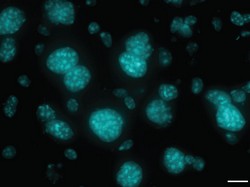Genome reprogramming in liver cancer
Emerging evidence indicates that cancer is a complex disease involving multiple genetic and epigenetic events that influence each other, over a long period of time. As a result, to understand cancer and develop effective targeted therapies, researchers need to investigate mutations and epigenetic alterations from the pre-neoplastic stage all the way to cancer development. To address this, the EU-funded MODHEP (Systems biology of liver cancer: An integrative genomic-epigenomic approach) initiative set out to describe the molecular basis for genome reprogramming at the genetic, epigenetic and structural levels in hepatocellular carcinoma (HCC). In this context, researchers employed advanced high-throughput sequencing technologies to produce genome-wide maps of alterations in DNA sequence, epigenetic marks, protein-DNA interactions, chromatin folding and gene expression. At the same time, they utilised imaging techniques to analyse changes in chromatin and nuclear organisation at the single-cell level. Analysis of human clinical samples and mouse models of HCC unveiled a high complexity of the non-coding transcriptome in HCC and led to the identification of non-coding RNAs with biomarker capacity. In addition, scientists identified a role for MAPK signalling in HCC, suggesting that it could be targeted therapeutically. Furthermore, a series of candidate genes were discovered and validated for their involvement in cellular transformation and cancer, paving the way for their therapeutic exploitation. Considerable effort went into the characterisation of epigenetic modifications in HCC and normal liver. This enabled researchers to highlight potential differences in the epigenetic machineries depending on the oncogenic events, and since epigenetic aberrations are reversible in nature, to propose relevant therapies. Among MEDHEP's technological achievements was the development of methodologies to study important aspects of genome structure. Given that the 3D genome is increasingly appreciated as an important epigenetic contributor to genome functioning, the generated tools have the capacity to provide an integrated picture of the dynamics between epigenetics, genome topology and gene expression. Taken together, MODHEP findings build an unprecedented view of the dynamic changes in genome organisation that are associated with tumour progression. This will steer cancer research into previously unexplored territories and lead to novel treatments.







